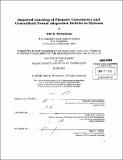Impaired learning of phonetic consistency and generalized neural adaptation deficits in dyslexia
Author(s)
Perrachione, Tyler K. (Tyler Kent)
DownloadFull printable version (9.201Mb)
Other Contributors
Massachusetts Institute of Technology. Dept. of Brain and Cognitive Sciences.
Advisor
John D.E. Gabrieli.
Terms of use
Metadata
Show full item recordAbstract
Developmental dyslexia is a neurological condition that specifically impairs the development of expert reading ability. Phonological processing deficits -- impaired representation of, or access to, the abstract units of spoken language -- have been implicated as the principal source of reading difficulties in dyslexia, independent of other cognitive factors. However, the source of these phonological impairments remains unknown: What mechanisms preclude development of the robust phonological representations critical for reading development? Experiments with phonological processing in dyslexia typically employ metalinguistic tasks that require explicit knowledge about phonological structure, failing to distinguish between access to representations and the representations themselves. Here I report a series of experiments that elucidate the nature of phonological impairments in dyslexia by examining the implicit processing of phonetic variability. Phonetic variability affects language processing at the interface between perceiving the physical speech signal and mapping it onto stored linguistic representations. This approach is well-suited to interrogate the integrity of phonological processing in dyslexia and to provide insight into how phonological representations may come to be impaired in this disorder. In Experiment 1, individuals with dyslexia demonstrated profoundly reduced ability to learn to use phonetic consistency in talker identification, thus reifying the status of phonological representations themselves as fundamentally impaired in this disorder. In Experiment 2, functional magnetic resonance imaging (fMRI) adaptation revealed reduced neural sensitivity to phonetic consistency during speech perception in individuals with dyslexia, indicating impaired rapid, implicit learning of phonetic-phonological consistency. The neural mechanisms that support such learning may be a specific instance of general brain mechanisms for adapting to stimulus consistency. In Experiment 3, fMRI adaptation further revealed that such exiguous neural plasticity in dyslexia is not limited to speech phonetics; instead, the core mechanisms of rapid adaptation to stimulus consistency appear to be dysfunctional in dyslexia, such that neural adaptation was reduced to all stimuli measured, whether auditory or visual, linguistic or non-linguistic. Deficits in neural adaptation may represent disruption of a core rapid plasticity mechanism for perceptual learning, dysfunction of which would impair the ability to develop the robust perceptual (phonological) representations critical to reading development.
Description
Thesis (Ph. D.)--Massachusetts Institute of Technology, Dept. of Brain and Cognitive Sciences, 2012. Cataloged from PDF version of thesis. Includes bibliographical references (p. 81-93).
Date issued
2012Department
Massachusetts Institute of Technology. Department of Brain and Cognitive SciencesPublisher
Massachusetts Institute of Technology
Keywords
Brain and Cognitive Sciences.